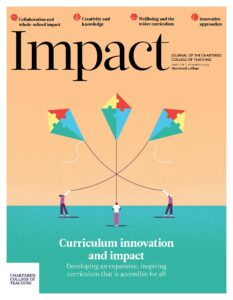Enabling students to feel a sense of belonging and connection through an inclusive curriculum
Written by: Sophie Smith-Tong

10 min read
Sophie Smith-Tong, Teacher and Founder, Mindfulness for Learning, UK
At the heart of creating an innovative and effective curriculum is enabling students to feel a sense of belonging and connection. American Psychologist Louis Cozolino states that ‘Children learn best when they feel protected and connected’ (2013, p. 241), so how can educators ensure that children feel valued by and are part of their school curriculum and learning?
The bid for a broad and balanced curriculum is ongoing and, at times, controversial. The 1960s saw the introduction of the comprehensive school and the 1980s saw the National Curriculum, designed to ensure that students learned the same subjects. In 1988, Section 28 of the Local Government Act 1988 prohibited educators from ‘promoting homosexuality’, sparking intense debate and hostility. Stonewall (nd) states that Section 28 ‘deprived generations of LGBTQ+ pupils the chance of seeing people like them in the books, plays, leaflets or films
Join us or sign in now to view the rest of this page
You're viewing this site as a guest, which only allows you to view a limited amount of content.
To view this page and get access to all our resources, join the Chartered College of Teaching (it's free for trainee teachers and half price for ECTs) or log in if you're already a member.
- Busby E (2023) Sex education in schools to be reviewed amid concerns over ‘inappropriate’ lessons. TES Magazine, 8 March, 23. Available at: www.independent.co.uk/news/education/sex-education-reviewed-government-school-b2296717.html (accessed 26 March 2023).
- Clark D (2021) Prison population in the United Kingdom (UK) from 1900 to 2022, by gender. Statista. Available at: www.statista.com/statistics/283475/prison-population-and-capacity-of-united-kingdom-uk-by-gender (accessed 5th April 2023).
- Cozolino L (2013) The Social Neuroscience of Education: Optimizing Attachment and Learning in the Classroom. WW Norton & Co. New York.
- Department for Education (DfE) (2021a) Development matters: Non-statutory curriculum guidance for the early years foundation stage. Available at: https://assets.publishing.service.gov.uk/government/uploads/system/uploads/attachment_data/file/1007446/6.7534_DfE_Development_Matters_Report_and_illustrations_web__2_.pdf (accessed 26 March 2023).
- Department for Education (DfE) (2021b) The reading framework: Teaching the foundations of literacy: Section 1: The importance of reading and a conceptual model. Available at: https://assets.publishing.service.gov.uk/government/uploads/system/uploads/attachment_data/file/1000908/Reading_framework_Teaching_the_foundations_of_literacy_-_Section_1.pdf (accessed 26 March 2023).
- Geena Davis Institute on Gender in Media (2021) LEGO creativity study: Total markets September 2021. Available at: https://seejane.org/wp-content/uploads/LEGO-Ready-for-Girls-Creativity-Study.pdf (accessed 26 March 2023).
- Griffin H (2018) Gender Equality in Primary Schools: A Guide for Teachers. Jessica Kingsley Publishers. London and Philadelphia.
- Lewis, H (2020) Difficult Women. A History of Feminism in 11 Fights. First published by Jonathan Cape.
- Local Government Act 1988 (c. 9) Section 28. Available at: www.legislation.gov.uk/ukpga/1988/9/section/28/enacted (accessed 25 March 2023).
- Myers A (2021) Supporting Transgender Students: Understanding Gender Identity and Reshaping School Culture. University of New Orleans. New Orleans, Louisiana.
- National Literacy Trust (2022) Literacy and Gender. Children and young people’s reading engagement in 2022. September 2022. https://literacytrust.org.uk/research-services/research-themes/literacy-and-gender/
- National Literacy Trust. Boys Reading Commission (2012) https://cdn.literacytrust.org.uk/media/documents/2012_06_01_free_other_-_boys_commission_report.pdf.pdf
- Pinkett M (2019) Boys Don’t Try? Rethinking Masculinity in Schools. Routledge. Oxon and New York.
- Robinson K (2022) Imagine If… Creating a Future for Us All. Penguin. USA and UK.
- Rycroft-Smith L with Andre G (2019) The Equal Classroom: Life-Changing Thinking About Gender. Routledge. Oxon and New York.
- Samaritans (2020) Latest suicide data. Available at: www.samaritans.org/about-samaritans/research-policy/suicide-facts-and-figures/latest-suicide-data (accessed 26 March 2023).
- Stonewall (nd) 18 November 2003: Section 28 bites the dust. Available at: www.stonewall.org.uk/our-work/campaigns/18-november-2003-section-28-bites-dust (accessed 25 March 2023).
- Stonewall (2017) School report: The experiences of lesbian, gay, bi and trans young people in Britain’s schools in 2017. Available at: www.stonewall.org.uk/system/files/the_school_report_2017.pdf (accessed 25 March 2023).
- Stonewall (2022) Creating an LGBT inclusive primary curriculum. Available at: www.stonewall.org.uk/system/files/stw_pearson_creating_an_inclusive_primary_curriculum_2022_1_-_march.pdf (accessed 25 March 2023).
- Taylor J and Shrive J (2020) The Primary School and Home School Guide: Ethical Sex and Relationships Education for Young Children. Victim Focus. UK.
0
0
votes
Please Rate this content
Please login to comment
0 Comments
Oldest
Newest
Most Voted
Inline Feedbacks
View all comments










